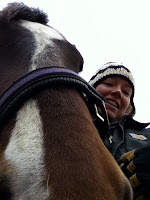Anthropologists spend a lot of time and energy thinking about the foods and food-related rituals and meanings of cultures the world over. In Mary Douglas' influential "Abominations of Leviticus", she explored the religion-based categorization of foods as edible and inedible. Marvin Harris' "The Riddle of the Sacred Cow" examines the Hindu prohibition against eating cows from a materialist perspective, arguing the myriad ways cows are more valuable to the society alive than as food. These canonic anthropological texts are decades old, but what has recently emerged as "Europe's Horse Meat Scandal" has once again highlighted the role of culture in defining what constitutes an edible animal, not just among anthropologists, but in popular media. And, of course, as an anthropologist and a horse girl, I just had to write about it.
I grew up riding horses. I love them. Love them. I have devoted years of my life to riding and caring for these magical creatures, working with them, and trying to rehab/rehome/and otherwise save them. I do not eat them though I try very hard to understand, and be ok with the fact, that others do.
So, several years ago, shortly after visiting some family friends in Switzerland, my father had the irrepressible need to share what he found to be a very funny experience. At dinner one evening, he asked the family's 9 year old daughter, "Do you like horses?"to which she responded, "Mmm, yum" while rubbing her belly. As my father tells it, he about fell out of his chair laughing as he pictured my response had I been there.
My father has spent a decent portion of his young adult and adult life living in France and has himself eaten horse so he did not find this statement or the behavior shocking, though given the context of his personal life (me!), he was certainly surprised in a "young girls like to ride horses not eat them!" kind of way. As much as I prefer to be culturally respectful when I travel, I cannot see myself voluntarily eating a horse (though there is some speculation that I have unknowingly done so at some point...) and when I've lived in places where horse meat was common, I've always found it moderately upsetting.
But here's the thing. I'm an anthropologist. It's my job to think about how culture has shaped the way we (people, so this includes me!) think about and define everything, including what we eat. So, intellectually, I get it. I understand why other cultures eat horse meat and I find it rather surprising when the Huffington Post tags articles on the topic with comments like "Gross!". I'm not a vegan - or even a vegetarian these days - but I do believe the critique that once we have made the decision to kill a living creature for our own sustenance, does it really matter which animal we kill? is worth while. Because this is where culture comes in. It is culture that defines which animals are edible and which ones are not. For example, this is why Americans are notoriously squeamish about foods that may be perfectly ordinary in other places - think escargot (snails) or crustaceans with their heads on and eyes intact. Whether based on religion, material/economic importance, or historical sentiment, culture guides the foods we should and should not consume.
Yet here's the thing that gets me every time. I know all of this and it still doesn't matter. I won't eat horse any more readily than I would eat dog, and while I know there is some personal sentiment involved, I don't think it's just about my personal attachment to these animals. After all, I can't imagine myself eating cat either, although I don't much care for cats in general and have never had a close relationship with one. In parts of South America, people eat guinea pigs. I have never had a guinea pig as a pet, but to me they simply don't constitute food. I don't find the prospect of eating bugs emotionally upsetting but I do find it stomach turning.
Part of what is so interesting about the European "horse meat scandal" is the fact that horse's role in Europe and Canada is quite similar to its role in the US. In all these places horses are used in work, and primarily for recreational purposes - whether as pets or sport horses. However, perhaps - and I'm no expert on this so I'm certainly open to alternative suggestions - the meaning of the horse still differs slightly in these varied contexts. The horse, in American culture, holds a special, almost mythical place that I'm not sure it holds in European or even Canadian societies. In the US, the horse dominates our lore about the Native American (becoming an integral part of both "noble savage" and "dominating white man" discourses). The horse is a vehicle for hero stories on race tracks and in movies about race tracks (the fact that these animals' realities rarely reach mythic standards is a totally separate issue). The horse represents the American West. Our relationship with horses comes to represent our relationship with nature and as such, the relationship between nature and culture (see Elizabeth Atwood Lawrence's Rodeo: An Anthropologist Looks at the Wild and the Tame). Thus, in addition to my personal relationship with the animal, all of these cultural factors shape a broader, shared cultural meaning of the horse that I draw upon when deciding how I feel about its consumption. As an anthropologist, I can intellectualize my culture all I want, but I cannot completely remove myself from it.
.JPG)


No comments:
Post a Comment